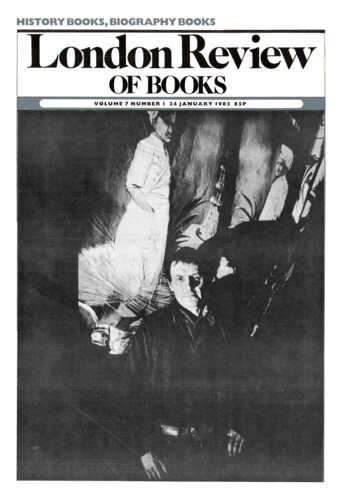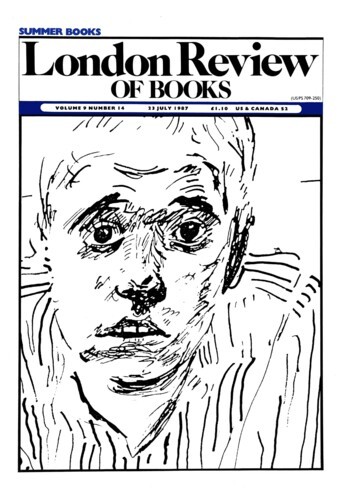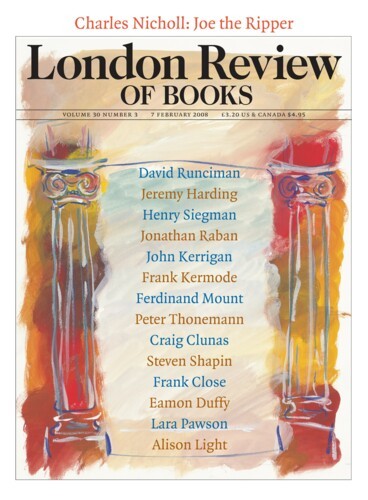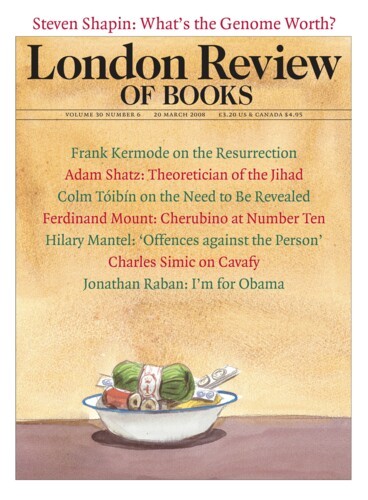Jonathan Raban
Jonathan Raban was the author of many books, of fiction, criticism, memoir, reporting and travel writing. He died on 17 January 2023. Father and Son, some of which first appeared as pieces in the LRB, will be published in the autumn.
Martian Arts
Jonathan Raban, 23 July 1987
In 1972 the final issue of Ian Hamilton’s Review was given over to a symposium on ‘The State of Poetry’. Only fifteen years on, it has the flavour of a yellowed historical document. The symposium’s tone is embattled: it finds enemies and traitors on every bookshelf, with the whole future of English poetry threatened by sinister forces. ‘American Poetry’ is seen as the big, bad colonial influence by more than half the 35 contributors, few of whom bother to make it clear whether they mean Robert Lowell, or Allen Ginsberg, or the Black Mountain imitators of William Carlos Williams. ‘The Liverpool Poets’ are regarded with a mixture of fear and derision. ‘The ranks of the illiterate raise puerile and rhythmless voices,’ wrote Roy Fuller. ‘Infantile simplicity is all,’ wrote Julian Symons.
Beastly to Canute
23 July 1987
Planes, Trains and SUVs: James Meek
Jonathan Raban, 7 February 2008
James Meek’s last, bestselling novel, The People’s Act of Love, published in 2005 to great critical acclaim, was set in 1919, in ‘that part of Siberia lying between Omsk and Krasnoyarsk’. Anglophone readers who can locate ‘that’ part of Siberia without a good atlas deserve spot prizes. The historical date and exotic location gave Meek a fictional and cultural space in which extraordinary events and people could seem believable, when placed inside a landscape rendered in exact and first-hand detail. Things are possible between Omsk and Krasnoyarsk in 1919 (as they used to be in first-century Palestine) that would raise eyebrows were they reported now in, say, Camden Town or Virginia. It’s a tribute to Meek’s skill as both a realist and a determined unrealist that he could seemingly invent a strange Christian sect of self-mutilated castrates and a cannibal who takes along a green companion on his journey lest he run short of food along the way, and then reveal in an afterword that such practices were well documented in the Russia of the time – which is rather like finding a footnote to One Hundred Years of Solitude directing one to a peer-reviewed article about inexplicable ascensions by means of bedsheets in Colombian villages.
Diary: I’m for Obama
Jonathan Raban, 20 March 2008
For the last few weeks, I’ve left the blue-sheathed national edition of the New York Times out in the yard, where it’s tossed over the gate at 3 a.m. each morning, and gone straight to the paper’s website, because news printed nine or ten hours ago is too old to keep up with the fast-moving course of the Democratic nomination battle. As an Obama supporter, I tremble for him as one trembles for the changing fortunes of the hero of an intensely gripping picaresque novel. What does the latest poll say? Has his campaign, usually sure-footed, stumbled into some damaging foolishness? Has another skeleton been uncovered in his closet? Has his vanity got the better of him again, as when he delivered his smirking line, ‘You’re likeable enough, Hillary’? Are the cloyed gazettes finally tiring of him?
Pieces about Jonathan Raban in the LRB
Your life depends on it: Jonathan Raban
Thomas Jones, 19 October 2006
Jonathan Raban’s first work of fiction, Foreign Land, was published in 1985; his second, Waxwings, in 2003; Surveillance is his third. A gap of almost twenty years, and then two novels in fairly...
Navigational Aids: Jonathan Raban and the ‘novel-sized city’
Liam McIlvanney, 6 November 2003
When the hero of Jonathan Raban’s new novel is scolded for living in a world of his ‘own construction’, the implied rebuke falls flat: this, for Raban, is the whole point of...
Funny Water: Raban at Sea
Frank Kermode, 20 January 2000
Jonathan Raban is afraid of the sea, saying it is not his element, which is probably why he spends so much time on it. He does not claim to be a world-class sailor, though he is obviously a...
When Dad Came Out Here
Stephen Fender, 12 December 1996
‘I am not a travel writer,’ Jonathan Raban said in a recent interview. ‘For me, “travel writer” means someone who samples other people’s holidays – you...
Some More Sea
Patrick O’Brian, 10 September 1992
The last few years have been rich in Oxford Books, and I have read three of them: 18th-Century Verse and 18th-Century Women Poets, both edited with great skill and...
Thank God for John Rayburn
Mark Ford, 24 January 1991
‘Travelling,’ Jonathan Raban once remarked, ‘is inherently a plotless, disordered, chaotic affair, where writing insists on connection, order, plot, signification.’ Even...
Tracts for the Times
Karl Miller, 17 August 1989
There can’t be all that many people who are willing, in the presence of others, to call themselves intellectuals. There may even be those for whom intellectuals are a fiction, like fairies....
Out of the jiffybag
Frank Kermode, 12 November 1987
Here begins a review of two books which are largely collections of reviews, and some readers, reviewing it, are sure to ask whether this flea-on-flea process is desirable or even tolerable. My...
Gentlemen Travellers
Denis Donoghue, 18 December 1986
‘I am assuming,’ Paul Fussell said in Abroad: British Literary Travelling Between the Wars (1980), ‘that travel is now impossible and that tourism is all we have left.’ To...
Costa del Pym
Nicholas Spice, 4 July 1985
In a letter to Robert Liddell dated 12 January 1940, Barbara Pym speaks well of her progress on a new novel, Crampton Hodnet, which she finished later that year, but which has only now surfaced...
Gentlemen Travellers
D.A.N. Jones, 15 September 1983
The cool, courteous Alexander Kinglake and the hot, contentious George Borrow are two of the best-liked and most influential travel writers of the 19th century. They were contemporaries for much...
An American Romance
Edward Mendelson, 18 February 1982
Old Glory – the book written by Jonathan Raban – is an altogether different book from the Old Glory that was praised in the reviews, but it is no less wonderful for that. The book the...
Read anywhere with the London Review of Books app, available now from the App Store for Apple devices, Google Play for Android devices and Amazon for your Kindle Fire.
Sign up to our newsletter
For highlights from the latest issue, our archive and the blog, as well as news, events and exclusive promotions.




